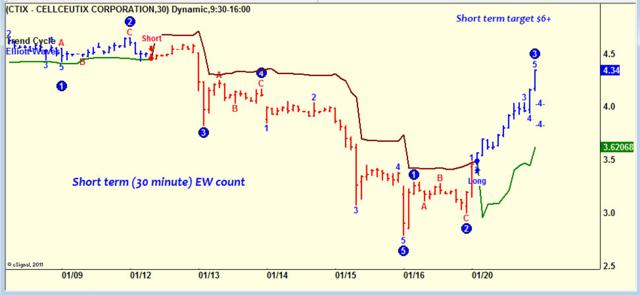Cellceutix's p53 Anti Cancer Drug Kevetrin Shrinks an Ovarian Cancer Spleen Lesion Metastasis in Clinical Trial at Harvard Cancer Center
Cellceutix (CTIX) just released breaking news on its novel p53 anti-cancer drug Kevetrin which is in clinical trials at Dana Farber Cancer Center.
Cellceutix just reported that in its 9th cohort a spleen lesion metastasis has been stabilized in a stage 4 Ovarian cancer patient. Ovarian cancer is the deadliest of gynecological cancers and is one of the leading causes of cancer-related death in women. This is a big breakthrough in cancer research as Kevetrin is only in a Phase 1 safety study and researchers are not looking for tumor shrinkage. Kevetrin is unlike any other chemotherapy or immunotherapy compounds, it is non genotoxic with no hematological, hepatic, or renal toxicity in patients. As a completely new class of chemistry in medicine, Kevetrin has significant potential to be a major breakthrough in the treatment of solid tumors. Mechanism of action studies showed Kevetrin's unique ability to affect both wild and mutant types of p53 (often referred to as the "Guardian Angel Gene" or the "Guardian Angel of the Human Genome") and that Kevetrin strongly induced apoptosis (cell death). p53 is an important tumor suppressor that acts to restrict proliferation by inducing cell cycle checkpoints, apoptosis, or cellular senescence. Dana Farber has just approved dosing to 450mg/m2 as well as asked the company to prepare a publication.
Cellceutix is not a one trick pony like 99.9% of the biotech company's out there. They also have a drug called Brilacidin. Brilacidin is a revolutionary drug in that it is a platform for many indications. It is a first-in-class small molecule in a completely novel class of drug called defensin-mimetic. The drug has a unique mechanism of action to imitate the body's front-line immunological defense, meaning that it selectively targets and destroys bacteria and not mammalian cells. Brilacidin is rapidly bactericidal which means it decreases the chance of the bacteria becoming resistant. Clinical trials and laboratory research showed Brilacidin as a disruptive technology that demonstrated potent, broad-spectrum activity against multiple Gram-positive pathogens as well as Gram-negative pathogens. Brilacidin has just successfully completed a Phase 2B clinical trial for ABSSSI showing a one-time dose of Brilacidin achieving statistically comparable results to the seven-day dosing regimen for the current gold standard treatment for ABSSSI, which sells about $1 billion a year of their drug, branded as Cubicin. In early December, Brilacidin received the coveted FDA QIDP designation. Also, Brilacidin is set to begin a Phase 2 clinical trial for Brilacidin-OM, an oral rinse for the prevention of Oral Mucositis (OM). This is very significant as there currently are no prophylaxes for OM, positioning Cellceutix as having a potential monopoly for the millions of sufferers of OM each year.
Let us also not forget about Prurisol, Cellceutix anti-Psoriasis drug that just successfully completed a Phase 1 crossover trial and is set to begin a Phase 2/3 clinical trial as treatment for moderate to severe psoriasis.
Cellceutix now has been aggressively moving forward with Kevetrin, Brilacidin, and Prurisol. Putting conservative values on Cellceutix's drugs at their current stages of development. I would place a $500 million conservative valuation on Kevetrin considering both the positive news being released from its clinical trial as well as the multi-billion dollar valuations of early stage immunotherapy cancer therapies, an additional $500 million for Brilacidin (just for the ABSSSI indication) as Brilacidin is potentially the best gram positive antibiotic out there and also considering Merck's $9.5 Billion dollar acquisition of Cubist as well as Durata Therapeutics being acquired for over $600 million dollars. I would place an additional $200 million dollar valuation on its other compounds as they are set to begin Phase 2 clinical trials for Oral Mucisitis, Proctitis, and Psoriasis. However this valuation can soon rise dramatically as clinical trials begin.
I first wrote up CTIX here on Seeking Alpha in December of 2012 as my 2013 Stock of The Year. At that time the shares were trading at $1.20. Two years later, just a few weeks ago, the shares traded at an all time high of $4.90. Yet the company is much stronger now, and further along on a fast track toward ground breaking, life saving, product development.
